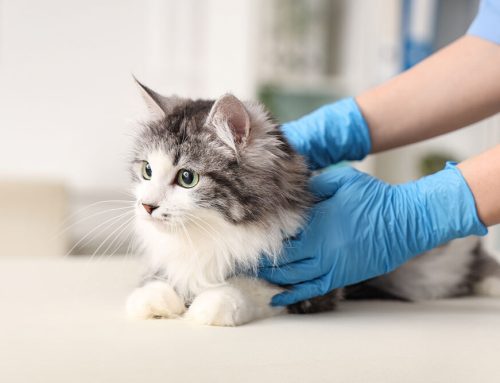New York winters can be quite cold, and you may be tempted to suspend your pet’s parasite prevention protocol—surely the nasty critters can’t live in these frightful conditions. Don’t be so hasty! Our team at Homestead Animal Hospital explains why your pet needs year-round parasite protection.
#1: Fleas can be problematic for your pet all year long
Fleas are more than a seasonal annoyance. While they thrive in warm, humid environments, they can survive near-freezing temperatures. These insidious parasites are also likely to seek a warmer abode when the temperatures start to drop, and they may decide to snuggle up inside your home. Fleas can cause many problems for your pet, including:
- Flea allergies — Many pets are allergic to the flea’s saliva, and a bite from a single, solitary flea can cause a distressing reaction. Signs include excessive, continuous scratching, biting, chewing, and rubbing. Other signs include hair loss, and red bumps on your pet’s abdomen, inner thighs, and tail base. All fleas must be eradicated from your pet’s body and environment to treat this condition, and numerous follow-up treatments may be required, since fleas are resistant to insecticides during certain life-cycle stages.
- Tapeworms — If your pet ingests an infected flea, they can be infected by tapeworms, which attach to your pet’s gastrointestinal tract to obtain nutrients. Signs include weight loss, anal irritation, which your pet often exhibits by scooting their hind end across the floor, and tapeworm segments on your pet’s tail or feces. Our veterinary professionals will prescribe an appropriate dewormer if your pet is infected.
- Anemia — Vulnerable pets, such as puppies, kittens, and senior pets, may develop anemia if they have a large flea infestation. In some cases, blood transfusions are required.
#2: Ticks can be problematic for your pet all year long
During the winter, ticks seek shelter under fallen leaves, and can remain active as long as temperatures stay above freezing. When your pet is walking through tall grass or in wooded areas, a tick can easily latch on, to get their next meal. If they stay attached for 36 hours or longer, they can transmit tick-borne diseases, such as Lyme disease, anaplasmosis, ehrlichiosis, and Rocky Mountain spotted fever. Signs are typically generalized, and include fever, lethargy, joint pain, and swollen lymph nodes. These diseases are usually responsive to antibiotics, but your pet may need treatment for weeks or months, depending on their infection severity. In certain cases, pets can experience life-threatening conditions, such as kidney failure, liver disease, and bleeding abnormalities.
#3: Your pet will need heartworm testing before receiving preventive medication
Heartworms are transmitted to your pet when an infected mosquito takes a blood meal. Baby heartworms, called microfilariae, enter your pet’s bloodstream and travel to the heart, where they mature and cause major damage to your pet’s heart, lungs, and vasculature. Signs in the initial stages are often absent or subtle, making detection difficult. As the disease progresses, signs in dogs include a mild, persistent cough, exercise intolerance, decreased appetite, and weight loss. Signs in cats include asthma-like attacks, vomiting, difficulty walking, and sudden death. If your pet has heartworm disease and they are given a heartworm preventive, the rapid parasite die-off can cause serious complications, and may be fatal. Therefore, all pets need a heartworm test before a prevention medication is administered.
By ensuring your pet receives their heartworm medication year-round, you can avoid your pet needing testing multiple times each year. In addition, mosquitoes can become active unexpectedly during a warm spell, and you wouldn’t want your pet to become infected during a lapse in prevention. Treatment for heartworm disease is extremely dangerous in dogs, and no treatment exists for cats, making prevention the best way to address the disease. Many products are available, including long-lasting injectable medications, which may make keeping your pet protected easier.
#4: Intestinal parasites need your pet’s warm body to survive
Intestinal parasites, such as tapeworms, hookworms, roundworms, whipworms, giardia, and coccidia, are typically transmitted when your pet ingests substances contaminated by infected feces. These parasites need your pet’s warm body to complete their life-cycle and reproduce. Signs include diarrhea, vomiting, weight loss, and poor coat condition. Fecal tests can be performed to see if your pet is affected by internal parasites. Depending on the parasites found, an appropriate deworming medication will be prescribed to remedy the infection.
#5: Preventing parasites in your pet is less expensive than treatment

You may think that parasite prevention medications are expensive, but they significantly reduce the risk that your pet will develop a parasite-transmitted disease, such as Lyme disease, heartworm disease, and flea allergies. These conditions can be extremely costly and difficult to treat, requiring ongoing veterinary care. Continuous parasite prevention is the best way to protect your pet and your pocket book.
Year-round parasite prevention is a crucial aspect of your pet’s wellness care. If you would like to discuss the most suitable parasite prevention program for your pet, contact our team at Homestead Animal Hospital and schedule an appointment.
















Leave A Comment